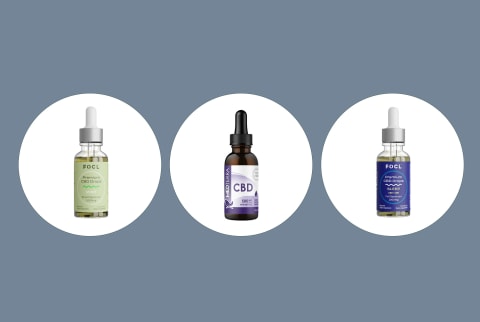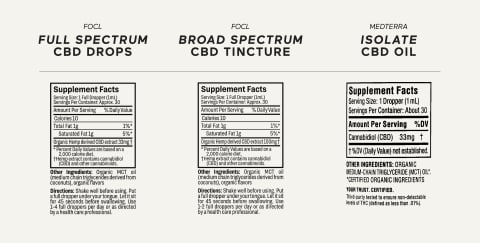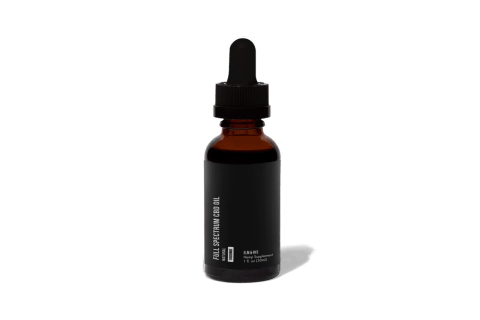Advertisement
Does CBD Show Up on Drug Tests? Here's What You Should Know



CBD has become a popular treatment for stress, poor sleep, and everyday aches and pains.* But does CBD show up on drug tests? Because CBD is produced from the cannabis plant, folks who are routinely drug tested may be skeptical to use it.
In short: Cannabidiol is not measured in a drug test. However, there is a chance CBD users may run into test complications. If you're concerned your favorite CBD product may pose an issue for an upcoming drug test, here's what you should know.
Does CBD show up on a drug test?
According to medical cannabis expert and double-board-certified doctor Dave Gordon, M.D., cannabidiol itself is not the issue.
"Most drug tests are specifically looking for THC and breakdown products (metabolites) of THC, and CBD is rarely, if ever, being tested," Gordon explains. "Any product that is completely free of THC should never be a problem with passing a drug test. These products are typically labeled as broad-spectrum CBD, CBD isolate, or 'THC-free.'" We'll dive deeper into the various types of CBD below.
While cannabidiol itself is not likely to trigger a positive drug test, Mignon Walker, M.D., director of SLIP Emotional Resilience Building explains that trace amounts of THC from ingested CBD products could. That means it is crucial for you, the consumer, to do your homework and know what's in your CBD.
How to read a CBD label
"A 2017 study1 showed that almost 70% of CBD products sold online are improperly labeled," says Walker. "Forty-two percent had more CBD than described on the label, and 26% had less CBD than indicated. Some products also had too much THC—this is a good argument for independent third-party testing."
Gordon agrees. "There is no regulation in the hemp and CBD space, and products often contain more or less of the ingredients listed on the package," he adds. "Purchasing from well-vetted, reputable vendors that post independent third-party testing of ingredients is always important, but it's especially imperative for those that are unfairly being drug tested for THC."
What's the difference between CBD and THC?
Hemp-derived CBD (cannabidiol) and THC (tetrahydrocannabinol2) come from the same plant, Cannabis sativa3. These leafy green plants contain hundreds of compounds, including terpenes, flavonoids, and cannabinoids. Cannabidiol and tetrahydrocannabinol are two of the 113 cannabinoids recognized in cannabis.
So, what's the difference between THC and CBD? While both can have an effect on our bodies and minds, THC is intoxicating, while CBD is not.*
Although cannabis has been increasingly legalized for medical and recreational use, the Food and Drug Administration4 (FDA) still considers it a Schedule 1 controlled substance. That's why hemp-derived CBD products have been filtered to only include the federal legal limit of THC, which is 0.3% or less.
To put it plainly: THC can get you high, but CBD alone will not.
Types of CBD
Remember, CBD is still largely unregulated. There are a few terms that have come to represent the various types of hemp-derived CBD and how they're processed.
Full-spectrum:
Full-spectrum hemp products contain cannabidiol and other compounds, including 0.3% or less tetrahydrocannabinol (THC). This trace amount is within the federal limit. CBD researchers5 believe full-spectrum hemp benefits from the "entourage effect," a theory that the combination of compounds has a more powerful impact.
Because it includes trace amounts of THC, full-spectrum hemp CBD is the most likely to trigger a positive drug test.
Broad-spectrum:
While this type of hemp contains other compounds such as terpenes and flavonoids, it is filtered to contain 0.0% THC.
THC is filtered out of broad-spectrum products, so they're less likely to produce a positive drug test. Still, it's not impossible. Broad-spectrum users should take extra care to read third-party lab results. These results will confirm whether the product label is accurate.
Isolate:
Isolate is the most basic form of CBD. It's been filtered to contain only cannabidiol without any additional compounds.
CBD isolate products are least likely to produce a positive drug test, as they don't include any amount of THC. Still, as with broad-spectrum products above, it's imperative you double-check the lab results for the product you plan to use.

How much THC must be present to trigger a positive drug test?
As Gordon explained, drug tests screen for THC or its metabolites6, particularly THC-COOH. These tests look for a concentration cutoff of THC or THC-COOH. The levels that trigger a positive result will vary based on the type of drug test.
After the 1988 Drug-Free Workplace Act, the Substance Abuse and Mental Health Services Administration established the concentration cutoffs used by most companies that perform routine drug testing. However, it's important to note that private companies are at liberty to drug test independently. This means concentration cutoffs and test methods may vary.
Urine tests
The most common type of drug test is a urine sample. In a urine test, levels of THC-COOH must be at a concentration of 50 nanograms per milliliter7 to trigger a positive result. As a general rule, THC metabolites can be detected in urine anywhere from one to 30 days8 after use. However, there are a lot of factors that can determine how long THC metabolites stay in someone's system. These factors include frequency of THC consumption, metabolism, and body size.
Other types of drug tests
Blood, saliva, and hair tests are less common collection methods. For these, the concentration levels are less defined. Here's a quick look at how long THC metabolites are detectable in these test samples:
- Blood: up to 36 hours
- Saliva: up to 48 hours
- Hair: up to 90 days
Ingestibles vs. topicals
"Topical CBD products, while possibly containing trace amounts of THC, may be absorbed through the skin into the muscles and nerves but do not get absorbed into the bloodstream or urine and are not detected in blood tests," Walker explains.
How to avoid a positive CBD drug test
If you're concerned about drug testing, there are a few considerations to keep in mind while shopping for or using CBD:
- Avoid full-spectrum CBD products. These contain up to 0.3% THC, which is within the federal legal limit. This amount of THC won't get you high but could still appear on a drug test. Some CBD products with higher amounts of THC are legal in certain states. Be sure to read the label thoroughly.
- Read the certificate of analysis (COA) for the product you purchase. This will confirm that the THC levels on the packaging match the independent lab results. If the product you're interested in does not share third-party lab results, it's time to switch to a more reputable brand.
- Research the brand's process as much as possible to avoid cross-contamination. If possible, stick with brands that test in independent, ISO-Accredited labs and manufacture their products in CGMP facilities9.
FAQ:
Will full-spectrum CBD cause a positive drug test?
According to Walker, "Trace amounts of THC in ingested CBD products may show up on drug tests." Because full-spectrum CBD products contain up to 0.3% THC, there is a chance they could lead to a positive result.
What shows up in a drug urine test?
Urine drug tests are used to detect alcohol, opioids and opiates, amphetamines, cocaine, and marijuana metabolites. While drug tests do not detect cannabidiol (CBD), some CBD products containing THC may trigger a positive result.
Is CBD a drug?
The 2018 Farm Bill removed hemp-derived CBD from the federal controlled substances list. According to the CDC, CBD is not impairing and will not cause a high. Still, the FDA does not regulate hemp CBD products. Some CBD products include trace (or above) levels of THC. That's why it's important to read both the product label and third-party lab results to know exactly what is in the product you use.
The takeaway
While drug tests don't screen for CBD, they do screen for THC. If you're concerned CBD will impact your drug test, it's best to stick with third-party-tested CBD isolate products that don't contain THC.
Above all, it's extremely important to do your research when picking a CBD product. Luckily, we've done a lot of the legwork for you by reviewing a slew of tinctures, lotions, and gummies that come from high-quality companies that don't hesitate to show their third-party lab results. If testing for THC is a concern, we have plenty of broad-spectrum or THC-free picks too!
9 Sources
- https://www.ncbi.nlm.nih.gov/pmc/articles/PMC5818782/
- https://www.ncbi.nlm.nih.gov/books/NBK563174/
- https://www.ncbi.nlm.nih.gov/pmc/articles/PMC7830475/
- https://www.fda.gov/news-events/public-health-focus/fda-regulation-cannabis-and-cannabis-derived-products-including-cannabidiol-cbd#:~:text=FDA%20treats%20products%20containing%20cannabis,products%20containing%20any%20other%20substance.
- https://www.ncbi.nlm.nih.gov/pmc/articles/PMC6334252/
- https://www.ncbi.nlm.nih.gov/pmc/articles/PMC3570572/
- https://www.ncbi.nlm.nih.gov/pmc/articles/PMC5330962/table/Tab1/?report=objectonly
- https://www.ncbi.nlm.nih.gov/books/NBK430801/#:~:text=Clinicians%20can%20detect%20marijuana%20use,from%201%20to%2030%20days.
- https://www.fda.gov/drugs/pharmaceutical-quality-resources/facts-about-current-good-manufacturing-practices-cgmps



















